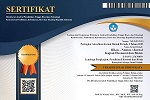TRANSFORMASI DIGITAL DAN STRATEGI MANAJEMEN
Abstract
Transformasi digital memaksa organisasi untuk mengikuti perkembangan teknologi yang cepat agar dapat bertahan dalam persaingan. Implementasi transformasi digital dapat meningkatkan efisiensi kinerja, pendapatan, dan mengubah budaya organisasi menjadi lebih baik. Namun, proses transformasi digital rumit, sulit, dan berisiko tinggi. Kegagalan dapat merugikan organisasi karena membutuhkan investasi besar dalam materi dan sumber daya manusia. Oleh karena itu, organisasi perlu mengidentifikasi strategi yang tepat dalam transformasi digital untuk menghindari kegagalan yang merugikan. Tujuan penelitian ini adalah menghasilkan strategi transformasi digital yang membantu organisasi bertahan dalam era disruptif. Penelitian ini berfokus pada faktor pendukung strategi transformasi digital dalam organisasi dengan meninjau 20 penelitian yang ada. Berdasarkan hasil peninjauan tersebut, ditemukan beberapa faktor yang dapat digunakan dalam proses transformasi digital organisasi. Hasil penelitian ini memberikan rekomendasi kepada organisasi yang ingin melakukan transformasi digital dengan tingkat keberhasilan tinggi.
Keywords
Full Text:
PDF (Bahasa Indonesia)References
Alkema, P., & Chen, J. (2019). The underlying factors of a successful organisational digital transformation. South African Journal of Information Management, 21(1), 1-11.
Almatrodi, I., & Skoumpopoulou, D. (2023). Organizational Routines and Digital Transformation : An Analysis of How Organizational Routines Impact Digital Transformation Transition in a Saudi University. System, 11(239).
Alrawadieh, Z., & Cetin, G. (2021). Digital transformation and revenue management : Evidence from the hotel industry. Tourism Economics, 27(2), 328-345. https://doi.org/10.1177/1354816620901928
Björkdahl, J. (2020). Strategies for Digitalization in Manufacturing Firms. California Management Review, 64(4), 17-36. https://doi.org/10.1177/0008125620920349
Brunetti, F., Matt, D. T., Bonfanti, A., Longhi, A. De, Pedrini, G., & Orzes, G. (2020). Digital transformation challenges : strategies emerging from a multi-stakeholder approach. The TQM Journal, 32(4), 697-724. https://doi.org/10.1108/TQM-12-2019-0309
Cantemir, M., Gabriel, P. A., & Dorin, B. (2023). Drivers Of Digital Transformation And Their Impact On Organizational Management. Studies in Business and Economics, 18(18), 149-171. https://doi.org/10.2478/sbe-2023-0009
Crupi, A., Sarto, N. Del, Minin, A. Di, Gregori, G. L., Lepore, D., Marinelli, L., & Spigarelli, F. (2020). The digital transformation of SMEs - a new knowledge broker called the digital innovation hub. JOURNAL OF KNOWLEDGE MANAGEMENT, 24(6), 1263-1288. https://doi.org/10.1108/JKM-11-2019-0623
Daspit, J. J. (2017). D. Andreini and C. Bettinelli: Business model innovation: from systematic literature review to future research directions. Journal of Management & Governance, 21(3), 785-792. https://doi.org/10.1007/s10997-017-9388-2
Hess, T., Matt, C., & Benlian, A. (2016). How German Media Companies Defined Their Digital Transformation Strategies. December.
Ismail, S. (2014). Exponential Organizations: Why New Organizations are Ten Times Better, Faster, and Cheaper than Yours (and What to Do About It). Diversion Books.
Jovi, M., Tijan, E., Vidmar, D., & Pucihar, A. (2022). Factors of Digital Transformation in the Maritime Transport Sector. Sustainability, 14, 1-18.
Khan, S., & Goel, A. (2022). A Perspective on Digital Transformation Among Indian Exporting Firms. FIIB Business Review, 1-11. https://doi.org/10.1177/23197145221093499
Killian, G., & Mcmanus, K. (2015). A marketing communications approach for the digital era : Managerial guidelines for social media integration. 539-541.
Kim, K., & Kim, B. (2022). Decision-Making Model for Reinforcing Digital Transformation Strategies Based on Artificial Intelligence Technology. Information, 13(253).
Kim, S., & Ha, T. (2023). Influential Variables and Causal Relations Impact on Innovative Performance and Sustainable Growth of SMEs in Aspect of Industry 4 . 0 and Digital Transformation. Sustainability.
Kitchenham, B., & Charters, S. M. (2007). Guidelines for performing Systematic Literature Reviews in Software Engineering Guidelines for performing Systematic Literature Reviews in Software Engineering EBSE Technical Report EBSE-2007-01 Software Engineering Group School of Computer Science and Mathematics Keele University Keele , Staffs Department of Computer Science University of Durham. October 2021.
Li, L. (2021). Digital transformation by SME entrepreneurs : A capability perspective Digital transformation by SME entrepreneurs : A capability perspective. June 2017. https://doi.org/10.1111/isj.12153
Liu, X., Wang, X., & Yu, W. (2023). Opportunity or Challenge ? Research on the Influence of Digital Finance on Digital Transformation of Agribusiness. Sustainability.
Lucian, E., & Adrian, C. (2023). The digital transformation of management consulting companies : a review. Information Systems and E-Business Management, 21, 415-436.
Morakanyane, R., Grace, A., & O'reilly, P. (2017). Conceptualizing Digital Transformation in Business Organizations : A Systematic Review of Literature.
Onetti, A., Zucchella, A., Jones, M. V, & Mcdougall-covin, P. P. (2012). Internationalization , innovation and entrepreneurship : Business models for new technology-based firms. J Manag Gov, August 2015. https://doi.org/10.1007/s10997-010-9154-1
Plesner, U., & Justesen, L. (2018). The transformation of work in digitized public sector organizations. https://doi.org/10.1108/JOCM-06-2017-0257
Pulliam, D. B., Liburd, H. L. B., & Munoko, I. (2022). The effects of person " specific , task , and environmental factors on digital transformation and innovation in auditing : A review of the literature. J Int Financ Manage Account, 33, 337-374. https://doi.org/10.1111/jifm.12148
Roger, D. (2016). The Digital Transformation Playbook: Rethink Your Business for The Digital Age. Columbia University Press.
Sehlin, D., Truedsson, M., & Cronemyr, P. (2019). A conceptual cooperative model designed for processes , digitalisation and innovation. International Journal of Quality and Service Sciences, 11(4), 504-522. https://doi.org/10.1108/IJQSS-02-2019-0028
Trieu, T. V. H., & Pavelková, D. (2022). Differences Of Education Level And Job Position In Digital Transformation Adoption In Vietnam ' S. Journal Of Eastern European And Central Asian Research, 9(3), 409-422.
Verhoef, P. C., Broekhuizen, T., Bart, Y., Bhattacharya, A., Dong, J. Q., Fabian, N., & Haenlein, M. (2021). Digital transformation : A multidisciplinary re fl ection and research agenda ☆. Journal of Business Research, 122(November 2019), 889-901. https://doi.org/10.1016/j.jbusres.2019.09.022
Westerman, G., Calméjane, C., & Bonnet, D., Ferraris, P., & McAfee, A. (2011). Digital Transformation: A roadmap for billion-dollar organizations. MIT Center for Digital Business and Capgemini Consulting, 1(1-68).
Zhang, X., & Xu, Y. (2022). Research on Successful Factors and Influencing Mechanism of the Digital Transformation in SMEs. Sustainability.
Zoppelletto, A., Orlandi, L. B., & Rossignoli, C. (2020). Adopting a digital transformation strategy to enhance business network commons regeneration : an explorative case study. The TQM Journal, 32(4), 561-585. https://doi.org/10.1108/TQM-04-2020-0077
DOI: https://doi.org/10.37479/jkeb.v16i1.20322
Refbacks
- There are currently no refbacks.
Copyright (c) 2023 Oikos Nomos: Jurnal Kajian Ekonomi dan Bisnis


1.png)








